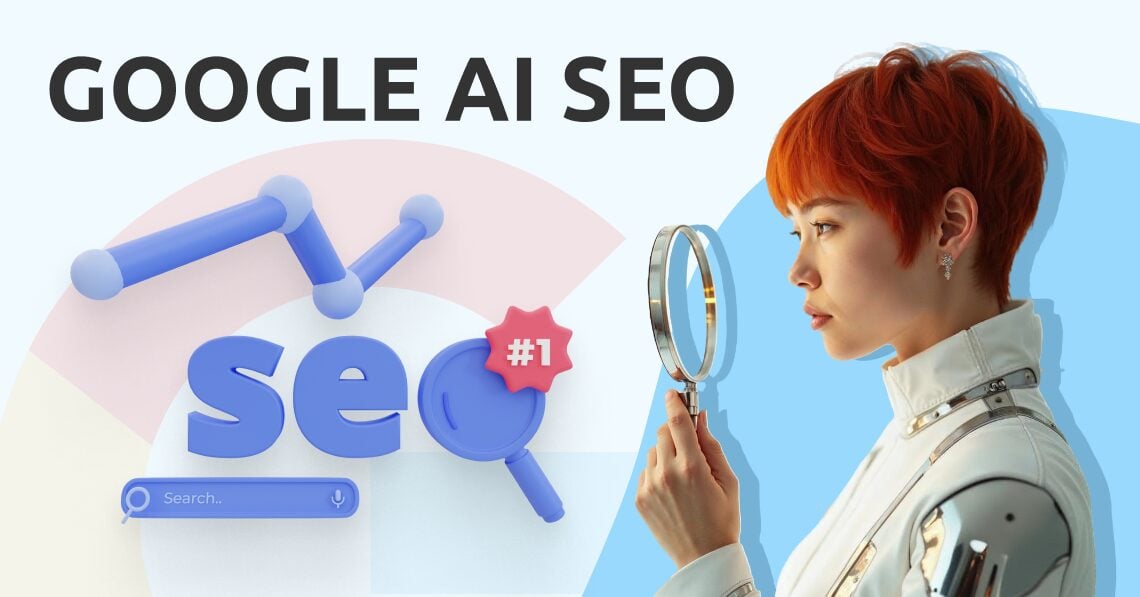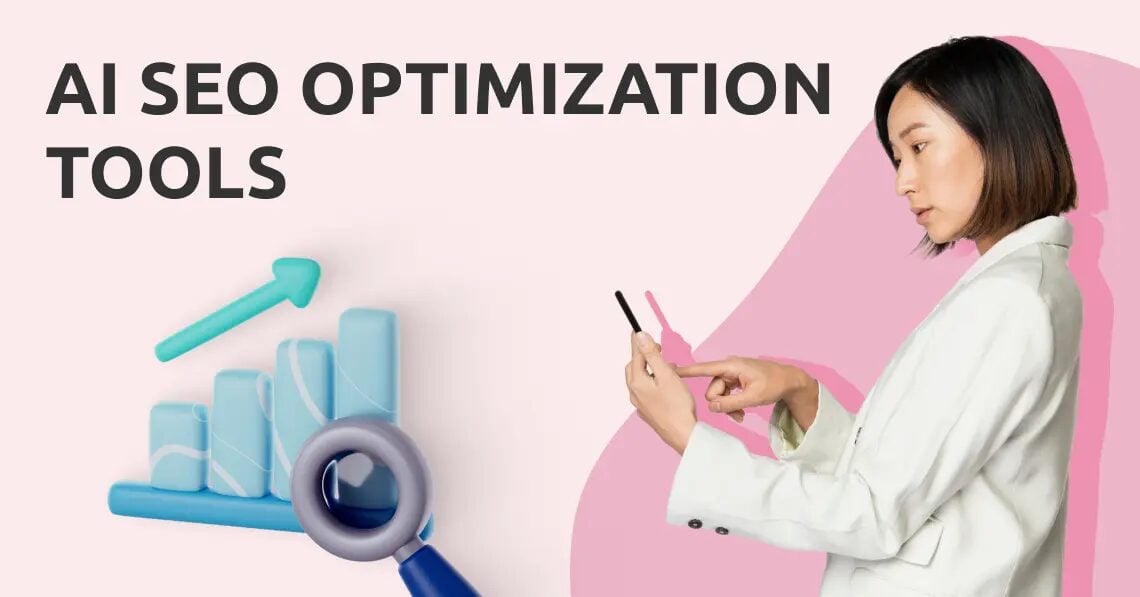We're living in a time when AI is as ubiquitous as smartphones, with many of us using it without even realizing it. The simplest example is the algorithm of the social media platforms we use every day, which tailor our feed to show us content they think we'll like. Then, there are chatbots, virtual assistants, personalized recommendations, and so on.
According to an Influencer Marketing Hub AI survey, more than 60% of respondents have used AI in their marketing operations, with 44.4% utilizing it for content production. However, the largest barrier to adoption (41.9%) was a lack of understanding or knowledge about AI.
AI has plenty of use cases in marketing, from content creation to predictive analysis. In this guide, we discuss AI marketing in detail. We also give you a comprehensive guide on its real-life applications and how it impacts various industries.
Plus, you'll get a peek into the AI trends that you should watch for in 2024.
The Ultimate Guide to AI Marketing in 2024:
What Is AI Marketing?
AI marketing refers to the use of artificial intelligence techniques, such as machine learning and natural language processing, to improve marketing activities. It aims to enhance marketing initiatives by saving time, reducing cost, improving efficiency, and boosting performance.
In today's time, AI marketing has become imperative because that's what customers expect. According to Michelle Taite, an AI Martech and fintech expert,
"Customers have a strong desire to see more innovation from the companies they support— including better products and newer ways to access those products."
The adoption of AI for marketing has been further fueled by the presence of a vast number of AI tools in the market. Be it content creation, data analysis, customer chatbots, or predictive modeling, AI tools are becoming increasingly affordable and accessible for businesses.
How Can Marketers Use AI?
AI is useful in pretty much every business aspect. According to a HubSpot report, every 1 in 5 business professionals use AI in their daily roles. Of these, 35% are marketers.
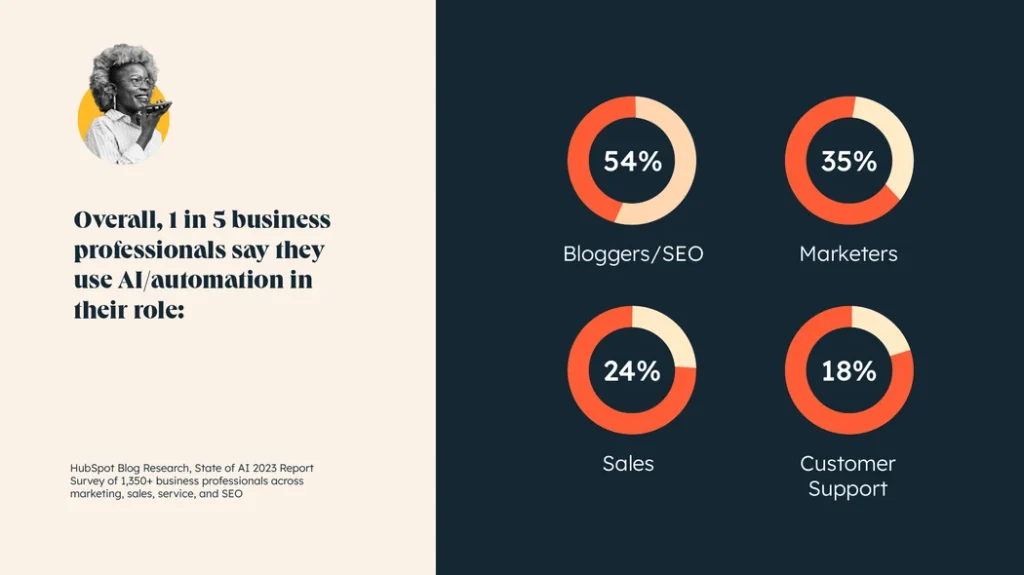
AI use in business
In marketing, these professionals use AI for a wide range of use cases. For example, 48% of marketers use AI for research. It could be market research, such as for a new product or service or competitor analysis.
Likewise, 45% of marketers also use AI to create content. While AI writing tools like Writesonic and Copy.ai can create textual content and translate marketing materials, generative AI tools such as Midjourney, Synthesia, Canva, and DeepBrain can create visual content, including images, videos, GIFs, animations, and more.
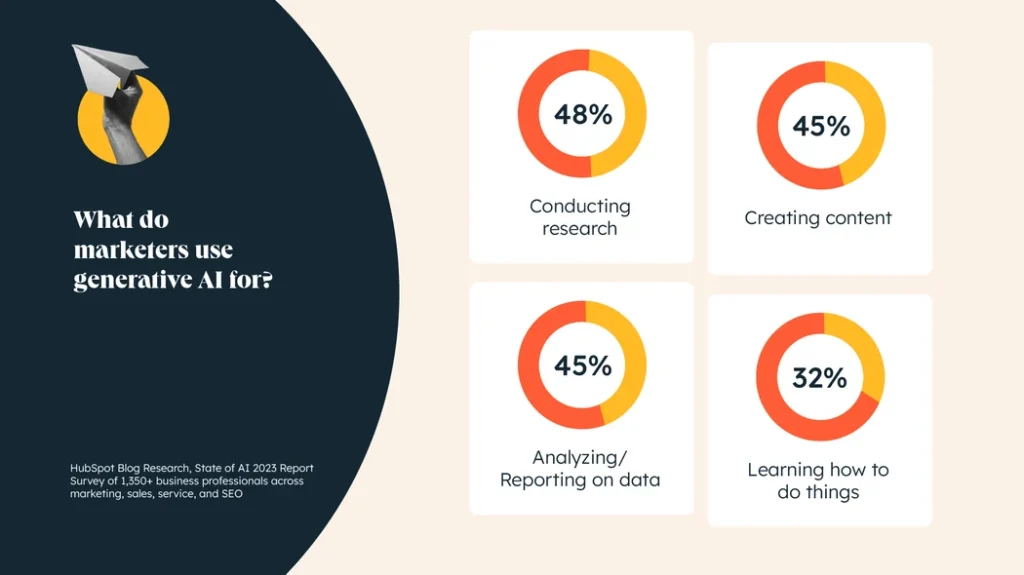
How marketers use generative AI
In the same report, 45% of marketers also said they use AI for data analysis. A good example is the use of AI to analyze customer data and create personalized marketing campaigns. Marketers can also use AI to segment their audience and create more targeted campaigns.
Another 32% of marketers learn how to do things using AI. That's a really exciting prospect in today's marketing landscape, where marketers have to keep on top of new trends and platforms. AI in education, both academic and professional, is forecasted to be worth $88.2 billion as an industry by 2032. The increasing number of marketers using AI for learning reflects this trend.
What Are the Core Elements of AI in Marketing?
While AI is a multi-faceted technology made up of many different underlying mechanisms, three core elements play a role in its use in marketing:
- Big data and analytics
- Machine learning
- AI platform solutions
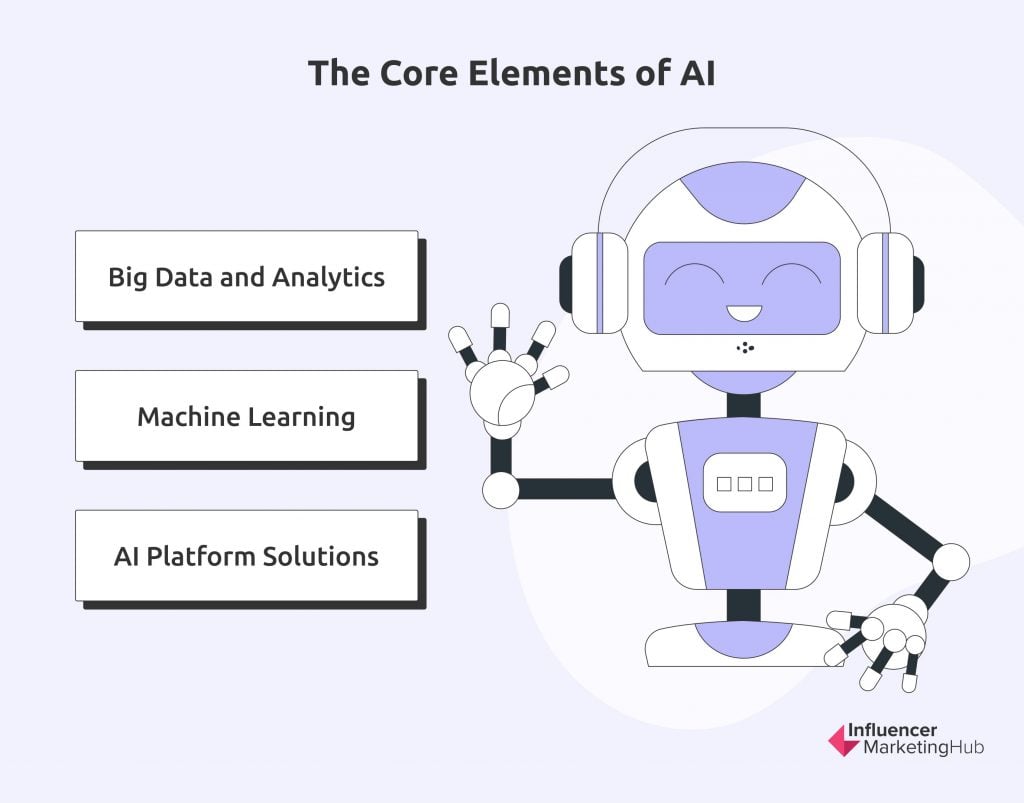
Core elements of AI
Big Data and Analytics
There is an ocean of data out there in the digital world. Marketers have to cull all this data and make sense of it to be able to use it in their marketing campaigns.
Suppose you're a yoga studio owner and you want to target your social media ads towards a specific demographic, say young moms. Big data and analytics will help you determine who this demographic is, where they live, what their interests are, what they seek in a yoga studio, how much they can afford to pay per month, and so on.
The use of big data in marketing isn't limited to a certain business type or size. In a survey, 46% of marketers said they use big data as a method of market research.
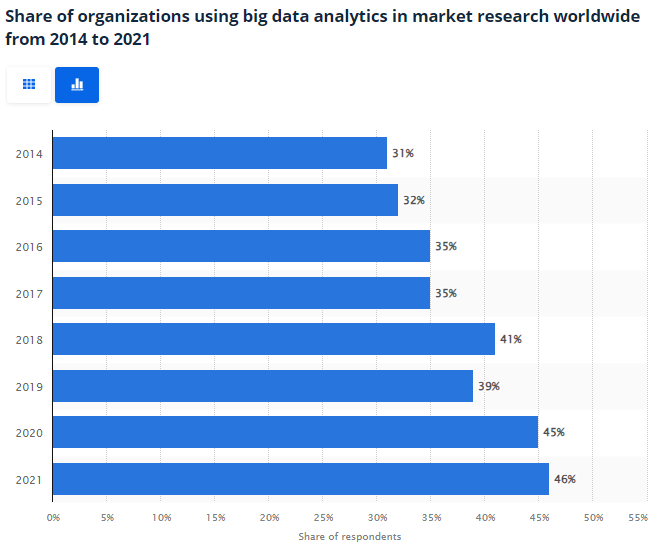
Share of organizations using big data analytics in market research
Besides customer data analytics, marketers also use big data to track their competition. For example, you need to know how well other yoga studios in your area are doing. Which marketing channels do they use? How much do they charge? What do customers say about them? Big data and analytics help you answer these questions.
Machine Learning
Driven by AI, information can be analyzed using computer algorithms. Both historical data and new information are correlated to make decisions that are most likely to yield the best results.
Machine learning is a growing field that was worth $150 billion in 2023 and is expected to add $50 billion to the global market every year. Forbes reports that
"marketing and sales prioritize AI and machine learning higher than any other department in enterprises as it continues to push the bounds of what's possible."
A good example of machine learning's use in marketing is customer support. Machine learning algorithms are trained on customer data and text-based interactions. They understand the customers and respond to them appropriately.
According to IBM, a bank using their watsonx Assistant for customer service found that the system answered 95% of customer questions correctly, and that too in multiple languages. A Forrester TEI study further found that the Assistant saved IBM's clients $6 per contained customer call.

Watsonx Assistant case study
Another example of machine learning in marketing is personalized recommendations. Sites like Netflix and Amazon use machine learning algorithms to analyze customer behavior and preferences, then suggest products or content that they are most likely to be interested in.
AI Platform Solutions
Part of the reason AI has become so common and widely used is due to the availability of AI platform solutions and tools.
AI tools come with the framework and infrastructure, making it easy for people with no AI or coding background to use AI models. It's due to this accessibility and ease of use that the number of people using AI tools is expected to go from 250 million in 2023 to past 700 million by 2030.
ChatGPT, Gemini, and Bard are such tools. Even for specific use cases like data analytics, marketers have access to tools like Polymer and Coefficient. Similarly, tools like Synthesia, Murf AI, Jasper, and Writesonic are available for content generation.
On the other hand, AI platform solutions are more complex and provide advanced capabilities for data scientists. These platforms allow users to develop and deploy complex AI models and algorithms and customize them to specific business needs.
Microsoft Azure AI is an excellent example. It allows businesses to innovate with the latest models and bring AI experiences to their daily work operations.
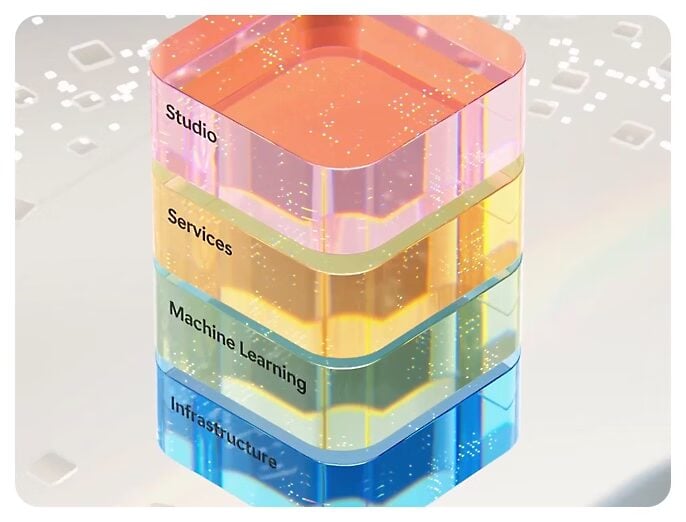
Azure AI
What Are the Applications of AI Marketing in Modern Businesses?
Based on the core elements of AI in marketing mentioned above, we'll now look at the technology's applications for marketers. Remember, even if you work in a specific industry, the applications mentioned below can be easily customized to suit your needs.
Marketing Data Analysis
Marketers have to work with a host of data, including customer information, trends, performance metrics, competitor analysis, and personalization reports. Manual management of all this data can be overwhelming and error-prone.
AI presents an opportunity for marketers to streamline data analysis. To start, AI tools can be used to compile, sort, and group data from various sources into a single database. Then, the same or other tools can help marketers analyze this data and derive insights from it.
Coefficient is one such tool. You can connect it with Google Docs or Excel to automatically import data from your spreadsheets.
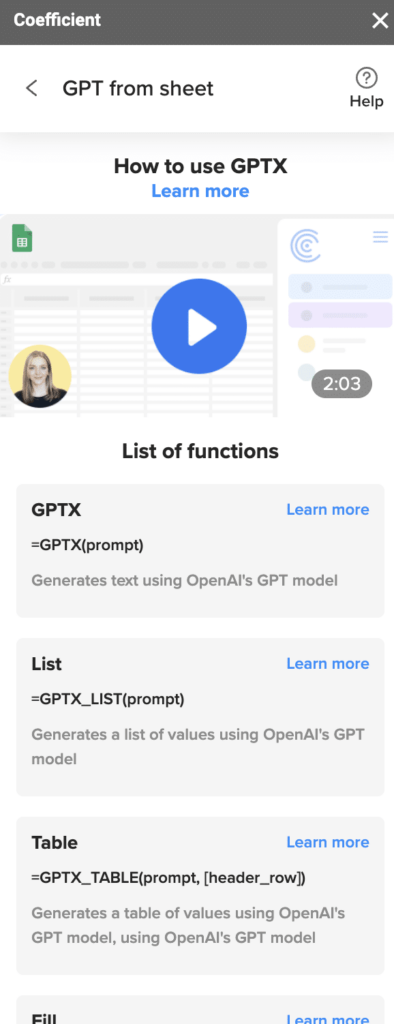
Source: coefficient.io
Then, you can use its ChatGPT integration to use the AI tool's functionality within your spreadsheets.
For example, you can use it to generate text, such as personalized messages, based on the data you've analyzed. Similarly, you can generate lists and tables, summarize input text, translate text, and even generate code to perform the specified task.
Polymer is another AI marketing tool that creates data-based dashboards without requiring users to have any engineering or data science skills. All you have to do is enter your data, and Polymer will do the rest.
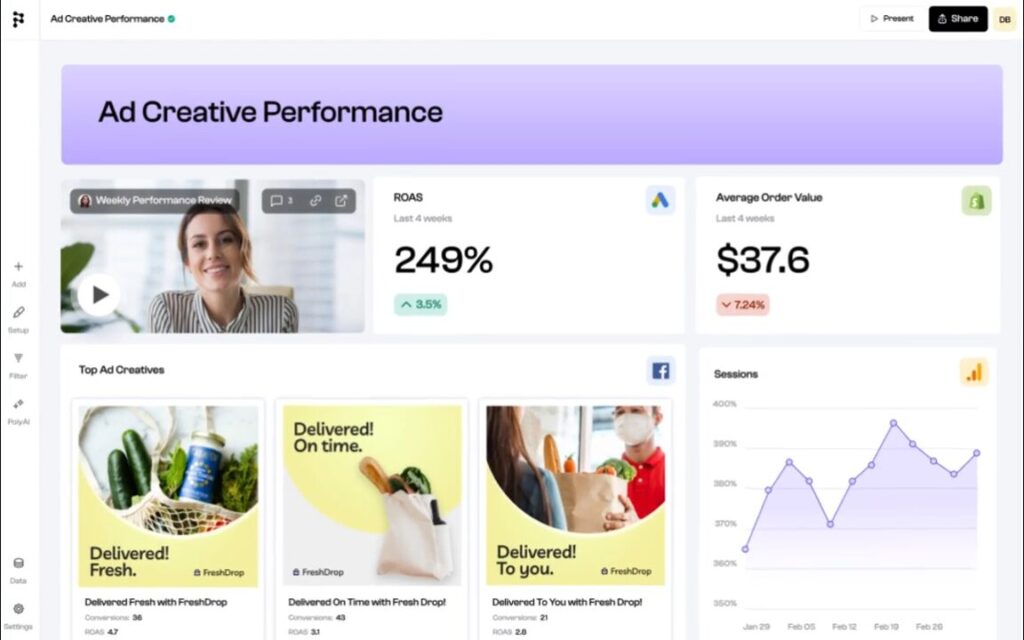
Polymer AI
Since it lets you connect data from all popular platforms like Facebook, Dropbox, Shopify, WooCommerce, and HubSpot, you can leverage AI to create any kind of report from shopping trends to ROI.
Content Creation
Content creation is one of the most common use cases of AI marketing. Marketers can use AI tools to write content, including email copy, blog copy, captions, social media posts, and meta descriptions.
As for visual content, AI tools can also generate images, videos, and audio for marketers to use in their marketing material. For example, Synthesia is an AI video generation tool that converts text into video. It comes with multiple voice-over and avatar options with support for more than 130 languages to cater to marketers from all over the world.
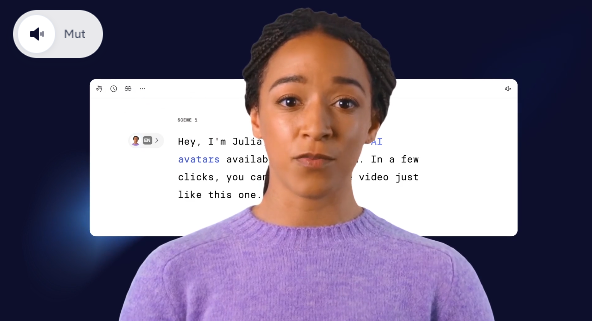
Synthesia AI avatar
According to HubSpot's report, 22% of marketers use AI for mere inspiration, while 20% use it for image generation and 20% for copywriting. AI tools can learn your style and tone, but they won't replace human creativity.
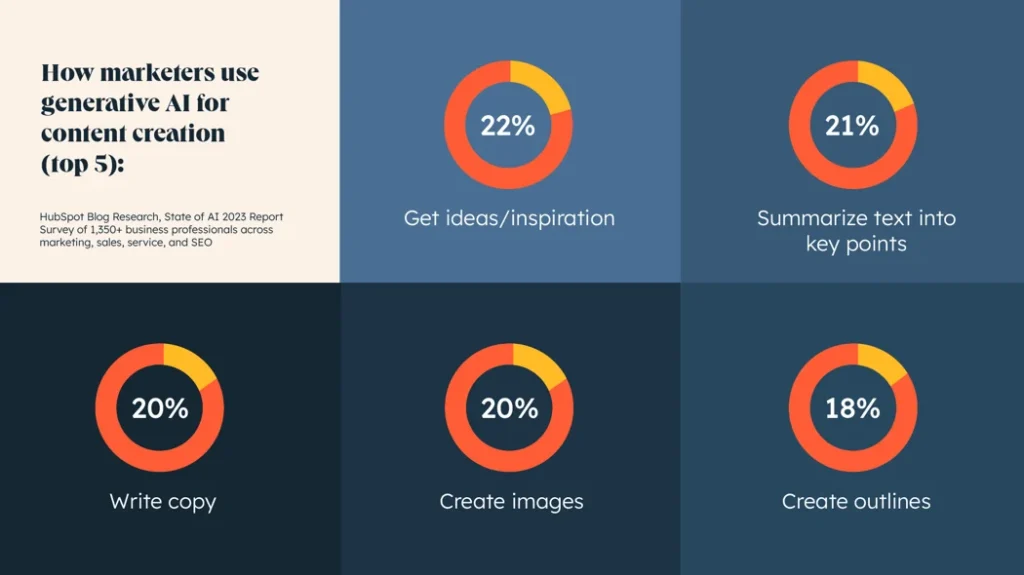
How marketers use AI for content creation
Human input is still crucial for producing quality content. Most marketers do not publish AI-generated content without any changes. In fact, HubSpot data shows that only 6% do so. The rest refine and edit the content to make it more natural-sounding or to remove any mistakes or duplicate content.
Marketing Personalization
Medallia's 2024 State of CX Personalization Report found that customer experience leaders who report high personalization capabilities are twice as likely to see 10% or more growth in revenue compared to those with low personalization capabilities. The same report also found that AI will be key in delivering significant levels of personalization.
As customers become more aware of their buying power, they expect brand interactions to be highly personalized. AI can be helpful in this regard.
For example, 6sense is an AI tool that gauges customer intent to determine who is ready to buy at the moment. It then sends them the right message to push them towards the purchase decision. Such a precise level of personalization allows businesses using 6sense to close deals 39% faster and experience a 133% increase in daily revenue generation.
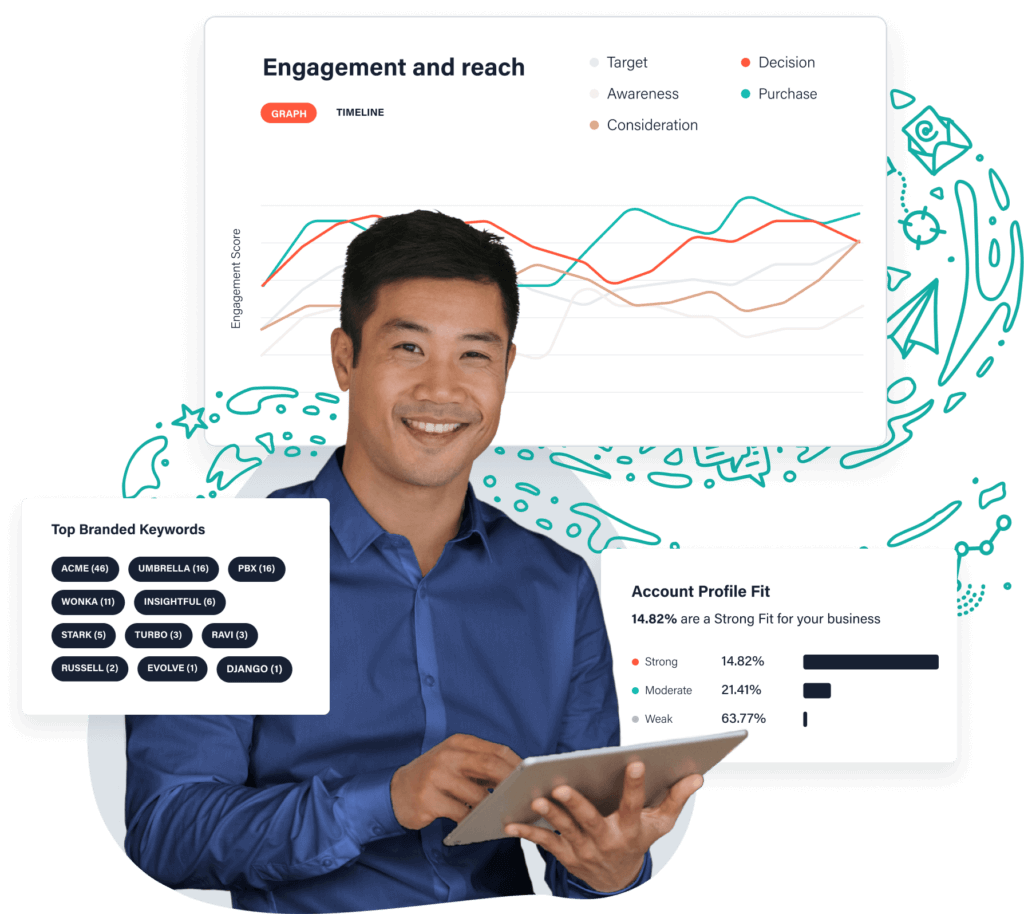
6sense AI
Marketers can also push out dynamic content with AI. Dynamic content changes according to the user's online behavior, name, gender, occupation, and similar factors. For example, you can create different versions of your website's landing page and have AI decide which version to display to each visitor based on their interests or behavior.
Work Efficiency and Time Effectiveness
Allison Horn, a managing director at Accenture, reports,
"We estimate as much as 40% of working hours will be augmented or automated by generative AI."
According to her, the time can be saved across multiple avenues, including process automation and data processing.
Similarly, Deloitte also reports that AI could free up 30% of the time for the workforce in the next five to seven years. For marketers, this could mean more time and freedom to work on the creative side of things rather than administrative and repetitive tasks.
For example, previously, if you needed to find something in a document, you'd have to go through it manually or rely on the clunky search functionality of whichever PDF reader you were using.
Now, you can simply feed the document to ChatGPT and ask it any question related to the document. It'll provide you with the relevant answer in a matter of seconds and even provide detailed insights.
Some other tasks AI can assist with in terms of time-saving and efficiency include data analysis, customer segmentation, content creation, and A/B testing.
Media Buying
There was a time when you'd have to go through numerous channels and negotiate with different media outlets to get your ad placed. It was a time-consuming and tedious process that could result in suboptimal results.
However, AI allows for programmatic advertising, where ads can be bought and placed through automated systems. For example, Responsive Google Ads (RSAs) use AI-powered technology to automatically create and test different ad combinations, optimizing for the best-performing ones.
Google AI also provides privacy-safe ad conversion measurements and bidding, allowing for more accurate and efficient ad placement.
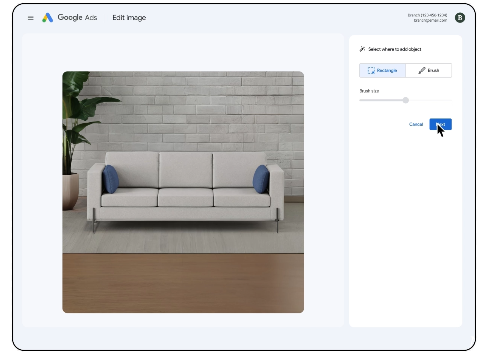
Source: blog.google
AI Email Marketing
Email marketers can also use AI-powered tools to enhance their strategies. AI can help with tasks such as subject line optimization, email personalization, content recommendations, and data analysis.
The Shortwave AI Assistant is one such tool. It provides a search functionality that lets you ask your inbox questions about old conversations. You can also use it to extract information from email threads, such as making a list of all tasks in the marketing campaign or all the commitments made in a meeting.
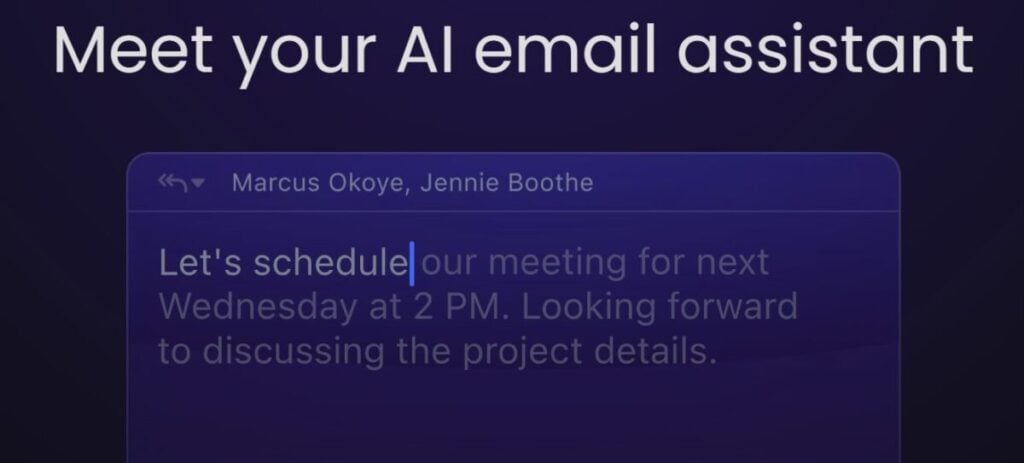
Shortwave AI Assistant
Even better, it can generate content like personalized emails and follow-ups. It also creates short summaries of all emails in your inbox for quick browsing and analysis.
Why Do You Need to Leverage AI in Marketing?
Leveraging AI is an excellent way for marketers like you to gain valuable insight into your customers' minds to understand them better and enhance their experience with your brand.
The enhanced customer experiences create a bond between your company and your customers that's strong enough to increase consumption and nurture loyalty.
AI allows you to understand your market better so you can create unique content, formulate personalized marketing campaigns, and offer more responsive smart solutions to their needs. All these are achieved without adding to the load of your workforce.
More importantly, you need to jump the AI bandwagon because your competitors are already doing it. Forbes Advisor surveyed hundreds of business owners who either use AI or plan to use it in their business operations. The report found that 55% of businesses use AI to provide personalized services.
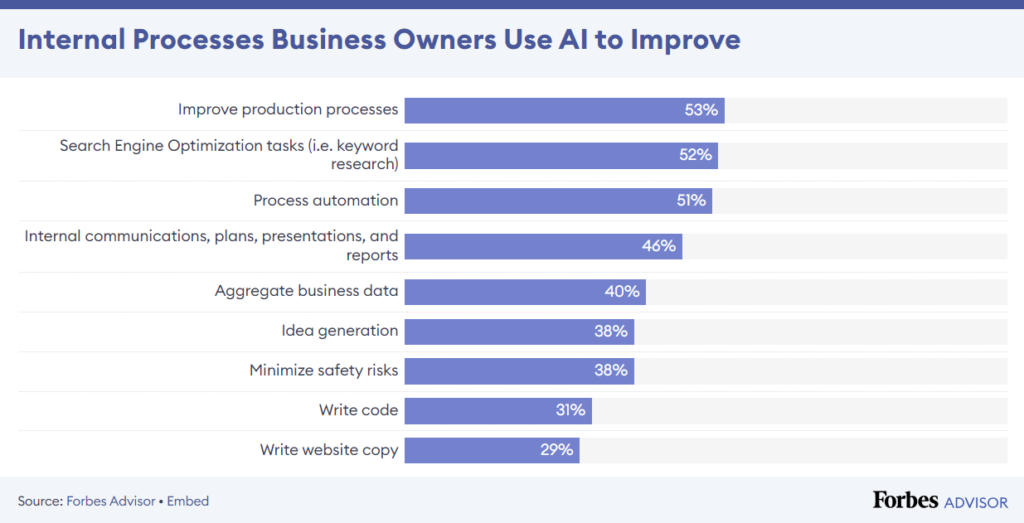
Ways AI improves customer experience
Almost 97% of these businesses believe ChatGPT to be helpful for their businesses, while 64% say that AI will improve their customer relationships. Similarly, in Q1 of 2024, Fortune showed findings from the Census Bureau, reporting that the number of companies that use AI has doubled in the US.
The good news is that even though customers are concerned about privacy, they're not completely opposed to the idea of AI use by businesses. In the Denstsu Consumer Navigator, the researchers found that 39% of customers are excited about the future of AI, and 78% believe that AI will be a part of their lives in the next ten years.
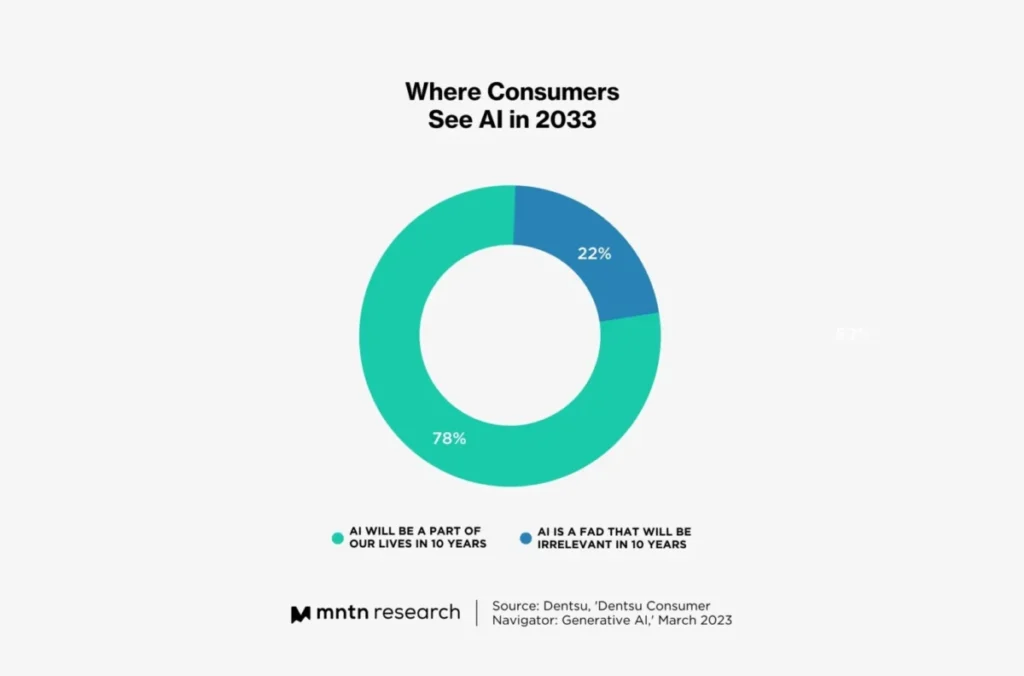
Where consumers see AI
Keeping all these trends and figures in mind, it's understandable why using AI has become a necessity for marketers. In addition to providing a competitive edge, it also allows businesses to better understand and cater to their customers' needs and streamline decision-making processes.
AI Marketing Trends to Watch Out For in 2024
Artificial intelligence and related technologies are still developing, and there is a lot of room for growth. Here are some trends to look out for in the marketing world as AI continues to evolve.
Large Language Models to Impact Conversational AI
In the next few years, we see Large Language Models (LLM) having an impact on conversational AI. As LLMs are trained on massive datasets in the terabytes and multiple parameters in the billions, they will define the next-generation conversational AI.
For marketers, this means more adaptive conversational tools that can enhance customer engagement. Customers are already accustomed to interacting with chatbots, voice assistants, and other forms of conversational AI. In a 2023 survey, 25% of consumers said that a chatbot answered their questions perfectly, and they ended up buying the product.
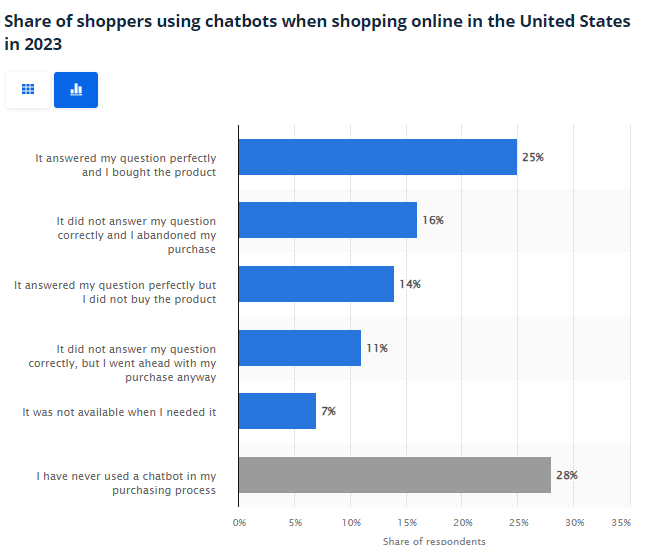
Share of shoppers using chatbots when shopping
However, 28% of customers said they have never used a chatbot during the purchase process, which means there's still a huge untapped potential for conversational AI in marketing.
AI Solutions Applied to Boost Cybersecurity
Statista reports that the biggest concern companies have around using generative AI is damage to their intellectual property. Security is also a concern among customers, with many of them reluctant to share personal information due to the fear of data breaches.
In response, AI-powered cybersecurity solutions are on the rise. The AI cybersecurity market is expected to be worth $133.8 billion in 2030, a stark increase from $24.3 billion in 2023.
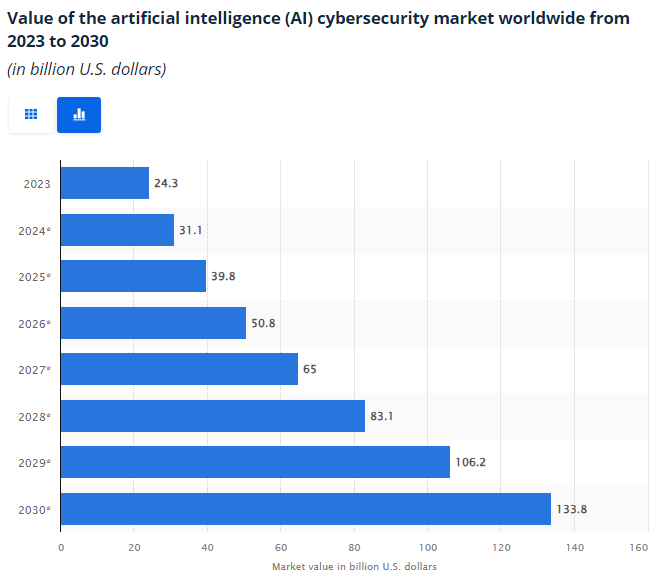
Value of AI cybersecurity market
These systems constantly analyze and detect potential threats, providing enhanced protection for both businesses and their customers. Plus, they can quickly identify patterns and anomalies in data that may indicate a cyber attack.
According to a 2023 survey, 60% of cybersecurity specialists believe that AI improves threat detection, whereas 57% say that it helps improve vulnerability management. Going forward, we can expect to see more AI in cybersecurity for marketing use cases.
The Use of Multimodal AI
Moving from single-modal AI, multimodal AI will combine conversational AI models with visual modalities. Google's Multitask Unified Model (MUM) is a familiar example of how this trend impacts AI marketing.
Through Google MUM, the search experience is enhanced through the T5 text-to-text framework, where search results are based on contextual information from multiple languages. For example, you can input images and text on Google MUM to get results on relevant topics.

Google MUM
New Verticalized AI Solutions Managed by Platform Providers
Platform and cloud providers have started to deliver tailored AI solutions for specific use cases. Romi Mahajan, the CEO of ExoFusion, says,
"Generic or "rhetorical" AI is no longer interesting; without a clear scenario-based or vertical use case, mentions of AI were just so much fluff."
Instead, platform providers specialize in AI by targeting specific industry use cases like finance, healthcare, or manufacturing. For example, Advaiya, a Microsoft partner, has created an AI-backed LLM legal query solution that helps law professionals automate research and extract relevant information from legal documents.
Similarly, Amazon and Google offer vertical integration through Connect and Contact Center AI. Both enable bot-driven conversations, intelligent routing, and automated assistance, features that marketing teams can leverage to improve customer experience during support.
Increased Demand for Responsible AI
As AI adoption increases, so does the demand for ethical and responsible AI practices. Both marketers and customers want to ensure that AI is not biased or discriminatory and that it is being used for the greater good.
In a GetResponse report, 568 marketers said their main concern regarding the use of AI tools in marketing is vague AI regulations and security. As we move towards a more AI-driven future, businesses and regulatory authorities will need to work together to establish clear guidelines for ethical and responsible AI practices.
Some marketers have already taken steps in this regard. For example, they disclose the use of AI in their marketing strategies. In a survey by Authority Hacker, 71.2% of marketers said that they would disclose AI content use in their marketing efforts.
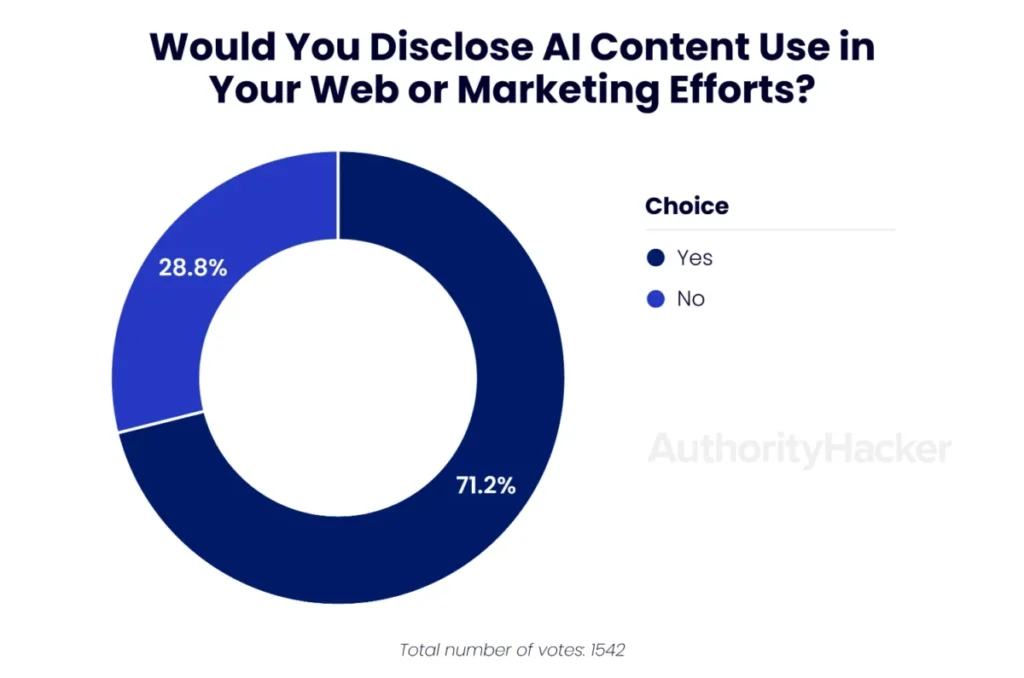
Marketers who would disclose AI content use
Wrapping Up
It is essential for marketers today to quickly adopt AI technology solutions to improve customer experience and enhance operational efficiencies.
Through AI, marketers will have a deeper and more comprehensive understanding of the perceptions and behavior of their target audiences. AI marketing can also lead to more optimized marketing campaigns with a greater probability of conversions and revenue generation.
The guide covers the many ways in which AI can be used in marketing. We've also discussed some trends you should keep an eye on.
Artificial intelligence is here to stay, but it does not solely hold the key to capturing the hearts of your customers. There is still some value to the human touch and emotional marketing. Together, these two approaches can bring the best results.
Frequently Asked Questions
How is AI used in marketing?
AI is primarily used in marketing for customer segmentation and targeting, personalization, chatbots, virtual assistants, data analysis and insights, content creation, and ad optimization.
What are some common AI marketing tools?
Some useful AI marketing tools include chatbots, predictive analytics platforms, customer relationship management (CRM) systems, email marketing automation tools, and content generation software.
What businesses or industries can benefit from AI Marketing?
Any business or industry with a target audience can benefit from AI marketing. Some industries that are already leveraging AI in their marketing efforts include retail, e-commerce, hospitality, healthcare, and finance.
How can marketers implement responsible AI?
Start by reducing bias in data collection by focusing on interest-based and behavioral variables rather than just demographics. Plus, ensure transparency by informing consumers about your AI models and give them control over their data by enabling personal preferences. To earn trust and encourage data sharing, highlight the benefits such as personalization and improved user experiences on your site.
Can AI replace human marketers?
AI can automate and enhance many marketing tasks, but it cannot replace human marketers entirely. Human creativity, strategic thinking, and emotional intelligence are still imperative to marketing.
